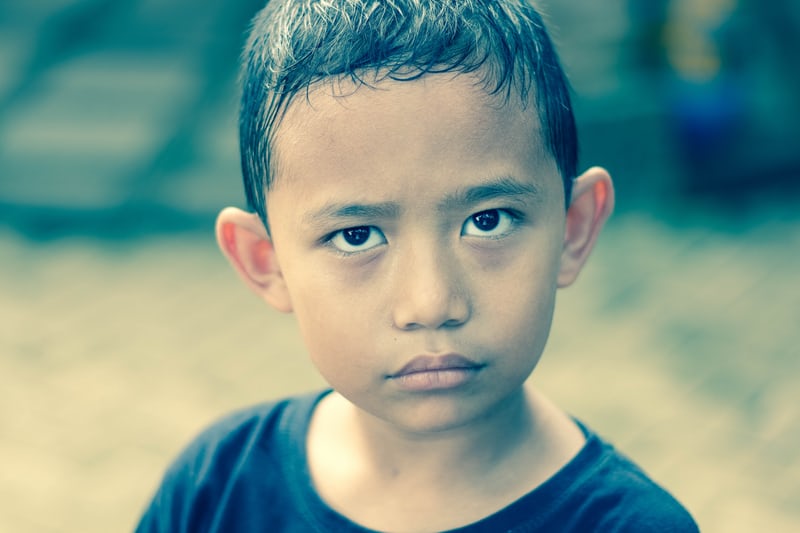More to meltdowns: You can help your kid find his safe space
Mark Lim, Focus On The Family Singapore // November 7, 2019, 6:00 am

The 'industry vs inferiority' stage of childhood is a lot about self-esteem and acceptance. Photo by Azees Math on Unsplash.
Our nine-year-old threw his writing book on the floor and burst into tears. “I can’t even get this right!” he declared. “I’m a failure!”
Despite our attempts to console him, he turned a deaf ear and marched to his room, slamming the door behind him.
The past few weeks have been hard for our older son. The amount of writing work he is assigned has increased exponentially, and he has been feeling the pressure to do well. Every mistake has become a blemish, and he is frustrated that he is not always able to complete his work without any mistakes.
Developmental stages
Psychologist Erik Erikson postulated that there are eight stages of psychosocial development. He calls the fourth stage “industry vs inferiority”, occurring between the ages of five and 12.
If children are affirmed for their initiatives, they will begin to feel competent and confident.
At this stage, children will be learning to read and write and to do things on their own, and their peer groups will become a major source of their self-esteem. They now feel the need to win approval by demonstrating specific competencies that are valued by society.
If they are affirmed for their initiatives, they will begin to feel industrious or competent, and feel confident in their ability to achieve goals. If they cannot develop the specific skills they feel society is demanding, they may develop a sense of inferiority.
Erikson also notes that for each stage of human development, individuals will either develop a sense of success or failure. Those who believe they have failed will be “stuck” in this life stage, carrying forward its issues into their next stage of development.
How can we help our children “succeed” in the “industry vs inferiority” stage of their development? There are two main ways: building their confidence and self-esteem, and helping them feel secure in their friendships with their peers.
1. Building confidence
Transitions in life are times of significant stress. Children are often not able to articulate the anxiety they feel and instead choose to use negative phrases such as “I am a failure” or “Nobody likes me”.
In order to create a safe space for kids to talk and to express their emotions in a healthy manner, parents need to listen first and not to pre-judge what their children say.
The truth is that God loves him regardless of what he does.
More importantly, we have to help our children realise that God is their ultimate safe space. Psalm 46:1-3 (New Life Version) says: God is our safe place and our strength. He is always our help when we are in trouble. So we will not be afraid, even if the earth is shaken and the mountains fall into the centre of the sea, and even if its waters go wild with storm and the mountains shake with its action.
With our nine-year-old’s meltdowns, we have realised that it is unwise to deal with children when they are in the midst of a tantrum, as they are unable to process the situation logically. So, we allow our son to express the full measure of his emotions and concurrently accept that things are hard for him.
Speaking to him only when he has calmed down, we also lavishly dish out encouragement and help him to re-wire his negative scripts by replacing them with positive words and proclaiming God’s truths over him.
For instance, we tell him that thoughts like “I am a failure” are lies from the evil one. The truth is that God loves him regardless of what he does.
We share that his identity is in Christ, and that when he feels sad or lonely or discouraged, he should turn to God and ask himself, “What is God saying to me?”
2. Nurturing friendships
Friends are an important aspect of a child’s life. It is important for parents to monitor our children’s friends and to assess if these relationships are healthy. This involves teaching our children how to choose the right friends, and for them to learn what is acceptable behaviour within a friendship.
We also need to teach our kids to be assertive if a friend tries to bully them. They would need to learn not to take things into their own hands, but to instead tell trusted adults like their parents. On our part, we have to stand up for our children when we feel they have been taken advantage of.

As far as bullying goes, parents should teach children not to take things into their own hands. Photo by Hisu lee on Unsplash.
Ultimately, our kids need to know that God fights their battles for them; they need only to turn to Him when they are in trouble.
Our younger son has had a number of scrapes with older children. At the age of seven, he is generally personable and makes friends easily. However, he has been taken advantage of a number of times.
We have to help our children realise that God is their ultimate safe space.
Recently, at an indoor playground, an older girl accused him of snatching a ball and her mother scolded him for this.
When we asked him about this, he insisted that he did not snatch the ball. I know my son. And I can tell if he is telling the truth. So I hugged him and told him that I believed him.
I then marched up to the girl’s mother, calmly informing her that my son did not snatch the ball and that she should clarify what had happened with her daughter. The mother did not reply, choosing to instead stare at the girl, who looked away in silence.
In addition to helping our kids manage the issues in their relationships, it is also important to help them build friendships.
There are actually many social skills involved. The first step is inclusion, which is helping a friend feel welcome if he or she is new to a group. You can do this by introducing the new friend and sharing one or two strengths about the person.
Scripting the future
The childhood years are a time when children deal with the key issues of identity and acceptance. By listening without judging and helping them to build confidence even in the face of mistakes or poor behaviour, we teach our children that home is a safe place for them to express themselves freely and develop to their fullest potential.
More importantly, it is key to teach our children to seek God when they are in need. For “he who dwells in the shelter of the Most High will abide in the shadow of the Almighty” (Psalm 91:1). If our children are able to find their safe space in God, they will be able to take refuge from whatever storms that may come their way.
This article was first written for Focus on the Family, Singapore and has been republished with permission.
We are an independent, non-profit organisation that relies on the generosity of our readers, such as yourself, to continue serving the kingdom. Every dollar donated goes directly back into our editorial coverage.
Would you consider partnering with us in our kingdom work by supporting us financially, either as a one-off donation, or a recurring pledge?
Support Salt&Light




